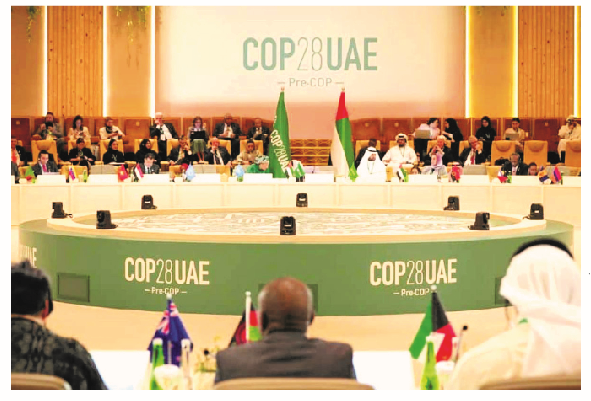The senior special assistant to the president on Sustainable Development Goals, SSAP-SDGs, Princess Adejoke Orelope-Adefulire, has emphasised the urgency of accelerating climate action plans through national financing strategies and Integrated National Financing Frameworks (INFFs), highlighting their critical role in climate action financing.
Princess Orelope-Adefulire made these remarks at a pivotal Climate Finance Side Event hosted by the office of the senior special assistant to the president on Sustainable Development Goals (OSSAP-SDGs) in collaboration with the European Union, EU, and the United Nations Development Programme, UNDP, at COP28 in Dubai, according to a statement.
The event showcased Nigeria’s dedication to climate action and sustainable development on the global stage.
The presidential aide emphasised the significance of addressing climate challenges as the global community approaches the midpoint of the 2030 Agenda for sustainable development, while highlighting the importance of the event in fostering discussions on financing strategies critical for climate action.
Demonstrating Nigeria’s commitment to the global climate agenda, Princess Adejoke Orelope-Adefulire highlighted the passage of the Climate Change Act 2021 and the establishment of a National Council on Climate Change.
She reminded the audience of Nigeria’s pledges at COP26 in 2021, including the ambitious target of achieving net-zero emissions by 2060.
The senior special assistant underscored the integrated approach to SDGs implementation in Nigeria, aligning short and medium-term national development plans with the SDGs since 2016.
She emphasised the importance of the Integrated National Financing Framework as a manifestation of Nigeria’s dedication to the 2030 Agenda and the Addis Ababa Action Agenda for financing development.
Looking ahead, Princess Adejoke Orelope-Adefulire outlined Nigeria’s commitment to prioritising key initiatives and reforms outlined in the INFF Roadmap.
Despite global fiscal challenges, the nation aims to mobilise public and private financing, ensuring prudence in public sector investments to support SDGs achievements.
The senior special assistant stressed the importance of partnerships with the United Nations Development system, private sector, and non-state actors for a holistic approach to implementing the INFF Roadmap in Nigeria.
In his remarks during the panel session, the minister of Finance and coordinating minister for the Economy, Wale Edun, who chairs the National Steering Committee on Nigeria’s INFF, highlighted how Nigeria would accelerate her Climate Action Plan through the INFF.
He noted that with global efforts in the implementation of the SDGs, climate action, inclusive facing serious challenges, climate action and ambition must be accelerated through international cooperation, collaboration, and mobilisation of the necessary financial resources.
He also emphasised that the SDGs require increased investments and alignments from public, private, domestic, and international sources, as the climate emergency is a global crisis that requires a global response.
Also speaking, Ahunna Eziakonwa, UNDP’s assistant administrator and regional director for Africa, praised Nigeria on the INFF initiative.
She stated that Nigeria recognises that understanding its internal financing landscape, making deliberate efforts to consider all economic dynamics, would benefit economic development, social enhancement, and the tackling of climate change.
She noted that to bridge the disconnect between the issues and funding, over 80 countries are turning to the INFF, insisting that the INFF, as one of the 12 SDGs stimulus packages, can help finance national climate goals and integrate the financing of climate actions and Nationally Determined Contributions, NDCs.
“Let’s not forget, climate change has an unwavering attack and impact on development gains. We are losing a lot of ground because of climate change. Many investments that have been made over decades are being lost.
So, what we are looking at today is a serious threat to our very essence. Let’s fight back by using the INFF as a tool to accelerate and build a resilient economy and resilient communities.” she said.
These positions were also echoed by the deputy minister on Maritime and Natural Resources/Head of National SDGs Secretariat Ministry of National Development Planning, Vivi Yulaswati,; director Global Committee on Social Business for SDGs China, Alex Wang and Ahmad Salihijo of the Rural Electrification Agency of Nigeria, who were the other members of the panel.





